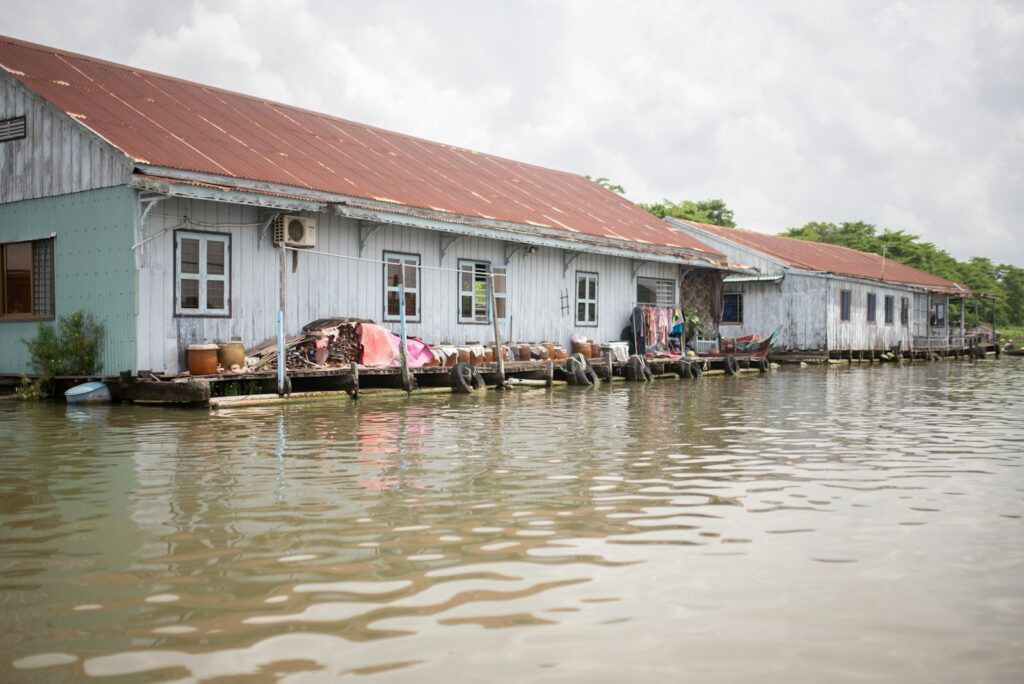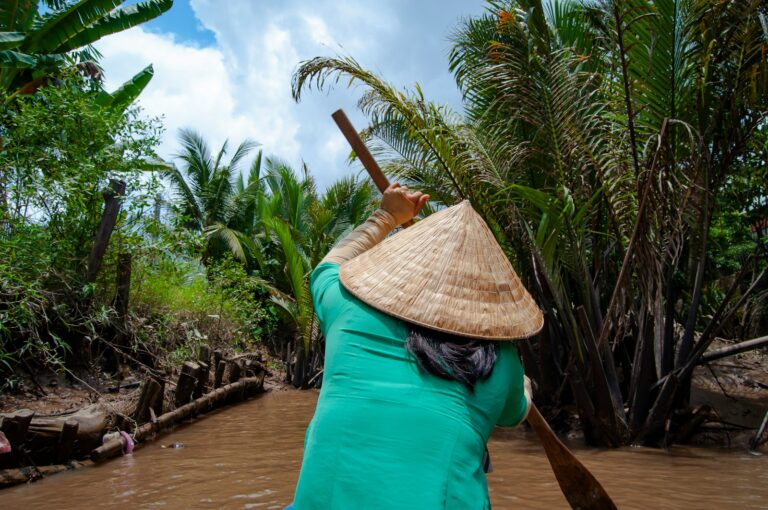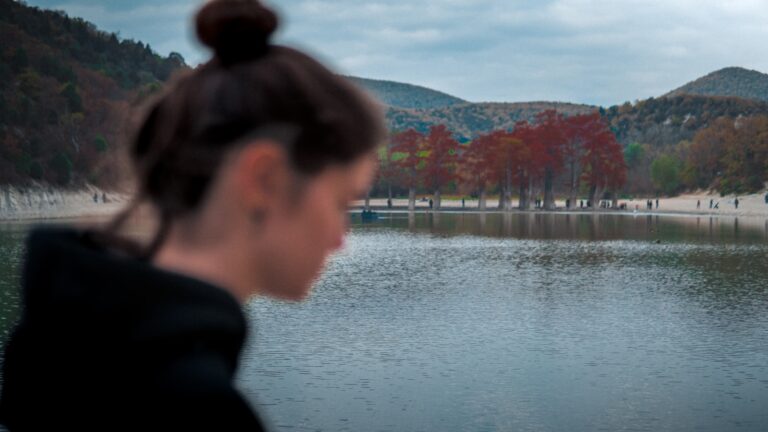Where the River Rules: Life, Love, and Survival in Vietnam’s Floating Heart
In Nga Bay, roads vanish and markets bloom on water. Here, resilience is a way of life—and sometimes, so is an unexpected connection that drifts between two strangers as the Mekong rises and falls.
Every year, the river comes for the land, swallowing paths, licking at doors. It moves without mercy, without apology. What happens when the ground you trust dissolves beneath your feet? When roads become rivers, and home becomes a floating dream? In Nga Bay, they do not run from this question—they live it. They endure, they adapt, they celebrate. Because the flood is more than water. It is danger, yes—but also promise.
And so, in the humid hush of dawn, when the sky is streaked in rose and tangerine and the Mekong breathes like a giant beneath a thin veil of mist, Nga Bay blooms on the water. Boats bloom, too—crowding like petals on a restless pond, their decks piled with fruit: pomelos, mangoes, jackfruit glowing like captured suns. Engines growl softly. Vendors’ voices rise and fall like a tide of their own. Who could resist this symphony? Who would not want to lean closer, to see the life that floats here?
This is Nga Bay Floating Market—the liquid heart of Hậu Giang Province, the soul of a town perched at the legendary confluence of seven rivers. Beneath the graceful arch of Phung Hiep Bridge, life is never still. It begins before dawn, surging into motion by five a.m., a choreography of commerce and community. But does it ever truly sleep? Perhaps not. Perhaps it pulses forever, even in the dark, like the heartbeat of the Delta itself.
“The River Carved These Lines”
On a narrow sampan, its hull as scarred as the hands that steer it, Lê Thị Mai moves like a woman born of water. At seventy-three, her body is small but strong, her smile glinting with gold teeth. She holds a jade-green pomelo in her weathered hands as tenderly as if it were a newborn. The name painted on her boat—Phước Lộc—means Fortune and Prosperity. Does she believe it still? Or is it just a memory carved into faded wood?
“This boat? My father built it. My children sold fruit here. Now my grandchildren play under the tarps,” she says, her voice a low ripple across the water. “The river carved these lines on my face, yes. But it feeds us too. Even in Mùa Nước Nổi, when the floods come, we tie tighter, we trade what the water gives—fish, water spinach. The market never sleeps. Neither do we.”
She laughs then, a quick burst of sound that floats across the river like a prayer unanswered yet somehow heard.
A Woman on the Bridge
From the bridge, the world tilts into a watercolor of motion: fruit-laden boats, children leaping from deck to deck, vendors shouting prices like songs. Here stands Nguyễn Thùy Linh, twenty-eight, her elbows resting on the railing, her hair catching threads of copper light as the sun slides west. What brought her back? Why did she leave? Does anyone ever truly leave this river?
“I thought the city held my future,” she admits, eyes fixed on the restless water below. For five years, she chased ambition in Saigon, her life a blur of glass towers and neon nights. But skyscrapers offer no roots, do they? “I missed this smell—wet earth, ripe fruit. I missed Bố checking flood marks on the house posts, the way Auntie Mai shouts prices like a song.” She pauses, the words gathering weight in her silence. “Saigon glittered, but it was cold. Here?” Her hand presses lightly to her chest. “This warmth… it’s belonging. It’s home.”
She does not notice the man who is watching her—not yet. Should she? Does he want her to?
The Stranger With a Stethoscope
Thomas Müller came here six months ago, a stethoscope around his neck and the naive hope that good intentions could hold back suffering. At thirty-two, the German doctor imagined the Mekong as a mission. He did not imagine how it would change him. Or what it might awaken.
“My first month, I treated three children for severe giardia from river water. Then Linh’s father came in with a leg infection from a submerged nail,” he recalls, his voice a deep, careful current. He looks out at the water, and for a moment, something unspoken shadows his face. “The toll is relentless. But then…”
He smiles faintly. “A woman fell between two boats near the bridge. Before our ambulance boat reached her, fishermen had pulled her out. Ms. Mai tore her shirt for a bandage. Someone boiled water for tea right there. No panic. Just action. They teach me resilience isn’t theory here. It’s necessity.”
What he does not say—not yet—is that Linh was there that day. That her hands held the injured woman’s with fierce calm, her white blouse soaked in rain, her hair plastered like ink against her skin. That their eyes met in the chaos—just for a second—but long enough for something to spark like sunlight on water. Did she feel it too? Or was it only him, standing there with a pounding heart, suddenly aware that the river wasn’t the only force pulling him under?
When the River Rises
To understand Nga Bay is to know Mùa Nước Nổi—the floating season. It begins as a whisper in August, when rains hammer faraway mountains, sending their burden downriver. The Mekong swells. Slowly, then all at once, the water claims what it desires. Roads disappear. Gardens drown. Doorsteps surrender. And life? Does it falter? No—it floats.
“See these marks?” says Nguyễn Văn Hải, Linh’s father, tapping the stilts beneath his home. His knuckles are white, gripping a hammer like a weapon. The wood bears scars—horizontal lines etched by past floods, each a memory of survival. “Last year, here. Year before, here. The water climbs higher every season. We hoist everything—rice sacks, the altar, schoolbooks. Fear? Always. But readiness too.”
When the flood comes, the market swells like a lung inhaling. Boats strain against ropes, decks gleam wet, hulls brim with fish and shrimp. “Ploughs? Useless now!” fisherman Trần Văn Đạt shouts, his laughter carrying across the brown expanse as he drags a net heavy with snakehead fish. “We hunt our front yard instead!”
Is it hardship? Yes. But is it also abundance? Absolutely. The river takes, but it gives in equal measure—if you know how to ask.
The Question That Lingers
For Linh and Thomas, surrender takes a different shape. It begins in fragments: a shared laugh when their hands brush reaching for the same vial, an unexpected warmth when rain forces them to huddle under the same tarp, the silence that blooms between them on a boat ride to deliver medicine to a stranded family. Neither speaks of what hums beneath their conversations. How could they? He is here to help, not to stay. She returned to rediscover her roots, not to tangle them around a foreigner’s heart. And yet—does the river care for such boundaries? Or does it pull everything toward its depths, unstoppable, inevitable?
How to Touch the Liquid Heart
To reach Nga Bay is to follow the water’s call. From Saigon, take a bus from Mien Tay Station and watch the city dissolve into a green mosaic, the journey stretching four and a half hours if the traffic shows mercy. A taxi trims the ride to four. Or glide south by hydrofoil to Can Tho, then hire a car for the last leg, where time slows and the air thickens with the scent of durian and smoke.
Step off near Phung Hiep Bridge. Listen. Feel it—the heartbeat of the market in the cry of vendors hawking jackfruit, in the splash of oars slicing dawn’s silence, in the laughter of children leaping from boat to boat. Will you stay long enough to understand it? Long enough to let it change you?
Because as the flood retreats and roads reappear, Nga Bay does not vanish. It shifts. It remembers. And the river keeps its secrets, even as it whispers them in ripples that glint like silver under the setting sun.
Here, life does not skirt the water. It surrenders to it—rises and falls with it—like breath, like love, like every fragile promise we ever dare to hold. And sometimes—if the season is right, if the current is kind—that promise lingers not in words, but in a glance across the water, in a question that floats like mist at dawn: What happens when the flood recedes—not just from the land, but from their hearts?




